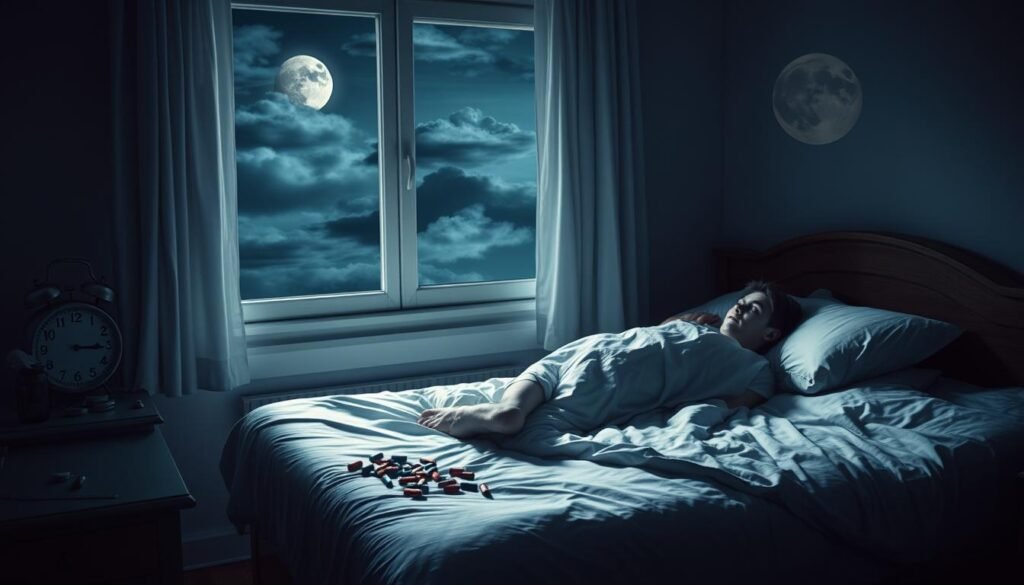Did you know insomnia causes over 5.5 million visits to family doctors each year? This fact shows how common maintenance insomnia is. It affects millions, upsetting their daily routines. Many seek help through sleep medications to improve their sleep quality and length. Yet, it’s key to note that while these sleep aids can offer relief for a while, adapting one’s lifestyle is just as crucial for addressing this ongoing sleep issue.
In this piece, we’ll explore the different sleep drugs for maintenance insomnia, how well they work, and their possible side effects. It’s important for patients to get advice from health experts before starting any insomnia treatment. This ensures a balanced plan for better sleep health. For extra details on using sleep drugs safely, click here: Sleep Medications for Maintenance Insomnia.
Key Takeaways
- Insomnia affects millions, with the prevalence notably higher among women and the elderly.
- While sleep medications are commonly prescribed, long-term solutions often emphasize lifestyle adjustments.
- Monitoring and consultation with healthcare providers can mitigate risks associated with prescription sleep aids.
- Benzodiazepines and non-benzodiazepine hypnotics are among the most frequently used medications but come with potential withdrawal challenges.
- Understanding the complete spectrum of insomnia treatment can lead to more effective management of sleep health.
Understanding Maintenance Insomnia
Maintenance insomnia makes it hard to stay asleep all night. People wake up often and feel tired during the day. About 10% of US adults have this issue, especially women and older people. This problem can harm your health, work, and emotions.
To understand this insomnia, we must look at the brain and emotions behind it. Older people often wake up more after falling asleep. Younger people have trouble falling asleep. Conditions like anxiety or chronic pain can make insomnia worse.
Treating it might include cognitive behavioral therapy (CBT-i). CBT-i helps change bad thoughts and actions related to sleep. It can improve sleep habits better than medicine. Combining different treatments often works best.
Symptoms of Maintenance Insomnia
People with maintenance insomnia face symptoms that make a good night’s sleep hard. It’s key to know these symptoms to find and tackle the cause of difficulties in sleeping.
Difficulty in Staying Asleep
Having trouble staying asleep is a common sign. Frequently waking up during the night is common. It leads to frustration and broken sleep. This issue messes up your sleep cycle and affects your day.
Those with this problem often feel moody and tired. They report a drop in energy and mood, feeling exhausted all the time.
Early Morning Awakenings
Waking up too early is also a sign of maintenance insomnia. Many can’t fall back asleep, feeling unrested. This lack of rest harms daytime performance.
Not being able to sleep again worsens insomnia’s impact. It hurts thinking and health. To sleep better, try keeping a regular sleep time or learn more about handling insomnia at Cleveland Clinic’s guide.

Chronic Sleep Disorders and Their Impact
Chronic sleep disorders significantly affect both individuals and society. It’s essential to understand the insomnia prevalence statistics. These numbers show how differently insomnia impacts people, especially when they have other health issues. This reveals a complex link between chronic sleep disorders and health conditions.
Statistics on Insomnia Prevalence
Insomnia impacts up to one-third of adults in the USA. It varies, with 10% to 15% of all adults affected. About 33% to 50% of adults display symptoms of insomnia. Women, divorced or separated people, those grieving, and older adults experience higher insomnia rates. This underlines the need for specialized treatment.
Common Comorbid Conditions
Insomnia often comes with other serious conditions like anxiety, depression, and chronic pain, known as comorbid conditions with insomnia. Those with chronic insomnia face a higher risk of major health problems. There’s a 27% to 45% greater chance of heart disease and a 16% higher risk of type 2 diabetes. These facts stress the importance of managing insomnia effectively.
| Condition | Insomnia Risk Increase (%) |
|---|---|
| Cardiovascular Disease | 27% to 45% |
| Type 2 Diabetes Mellitus | 16% |
| GERD | 300% (3 times higher) |
Overview of Sleep Medications for Maintenance Insomnia
Those dealing with maintenance insomnia have many treatments to consider. These include prescription sleep meds and over-the-counter aids. It’s crucial to know the differences between these options to manage insomnia well.
Prescription vs. Over-the-Counter Options
Prescription sleep medications include benzodiazepines and non-benzodiazepine hypnotics. They may work better but have risks like dizziness, nausea, and prolonged drowsiness. These side effects are more common in older adults or anyone with kidney or liver problems.
Over-the-counter options like diphenhydramine and doxylamine are easy to get but might not fully solve chronic insomnia. Insurance might also limit how much of these drugs you can get. Often, other treatments are tried before these medications are suggested.
Guideline Recommendations for Treatments
The American Academy of Sleep Medicine (AASM) suggests a different approach. They say cognitive behavioral therapy (CBT) should be the first choice for long-term insomnia. Medications are next, but only if strategies like CBT don’t work well enough. Non-benzodiazepine receptor agonists are seen as good long-term options. They help improve life quality without causing tolerance issues.
It’s very important to use prescription medications safely. They should not be mixed with things like alcohol because it can increase their sedative effects.

Types of Sleep Medications
It’s important to know about sleep medications for managing insomnia properly. There are several types, each with its benefits and risks.
Benzodiazepines, like alprazolam (Xanax) and clonazepam (Klonopin), are used for short-term insomnia. They provide quick relief but can be habit-forming if used too long.
Non-benzodiazepine hypnotics, such as eszopiclone (Lunesta) and zolpidem (Ambien), are also for short-term use. They work well but have misuse and dependency risks too.
Melatonin receptor stimulators like ramelteon (Rozerem) target sleep onset. Approved in 2005, it’s good for long-term use without addiction risks.
Orexin receptor antagonists, including lemborexant (Dayvigo) and suvorexant (Belsomra), are new. They block wakefulness chemicals, helping the sleep-wake cycle. However, suvorexant can be habit-forming.
Some might find antidepressants or antianxiety meds, like trazodone or quetiapine (Seroquel), useful for sleep. They can make you sleepy because of their side effects.
| Medication Type | Examples | Primary Use | Risk of Dependency |
|---|---|---|---|
| Benzodiazepines | Alprazolam (Xanax), Clonazepam (Klonopin) | Short-term insomnia, parasomnias | High |
| Non-benzodiazepine Hypnotics | Eszopiclone (Lunesta), Zolpidem (Ambien) | Short-term insomnia | Moderate to High |
| Melatonin Receptor Stimulators | Ramelteon (Rozerem) | Long-term insomnia management | Low |
| Orexin Receptor Antagonists | Lemborexant (Dayvigo), Suvorexant (Belsomra) | Sleep-wake cycle regulation | Moderate |
| Antidepressants/Anxiolytics | Trazodone, Quetiapine (Seroquel) | Occasional sleep aid | Low to Moderate |

Knowing about these sleep medications helps in talking to doctors about the best choice for you. It ensures safe and right use of these drugs for insomnia.
Prescription Sleep Medications
Prescription sleep meds are key for treating insomnia, especially when it’s hard to stay asleep. Getting the right diagnosis can lead to specific treatments. Knowing about benzodiazepine pros and cons is vital for doctors and their patients.
Benzodiazepines: Pros and Cons
Benzodiazepines, like temazepam and triazolam, work well to help you sleep. They make the quality of sleep better. They work quickly, helping people with ongoing sleep problems. But, it’s crucial to weigh the good and bad sides, like the risk of addiction and memory problems with long use.
- Pros:
- Good for starting and keeping sleep
- Work fast to ease sleep trouble
- Cons:
- May lead to tolerance and dependence
- Can cause memory and coordination issues
Non-Benzodiazepine Hypnotics: Current Trends
Non-benzodiazepine hypnotics, like eszopiclone and zaleplon, are now popular as sleep med alternatives. They tend to have fewer side effects and lower addiction risk versus benzodiazepines. Healthcare providers are choosing them more often nowadays.
Both types of sleep meds serve different needs. Blending meds with therapy or behavioral methods works best. This approach is part of thorough sleep assessments. It helps understand and address sleep problems properly.
Sleep Medications for Maintenance Insomnia
Dealing with maintenance insomnia means carefully choosing sleep medications. These meds aim to increase sleep time and quality. Eszopiclone and doxepin are top choices, known for making sleep better and reducing wake-ups.
These medications have strong support from clinical studies. They especially help with staying asleep throughout the night. This can greatly improve how well you sleep overall and how you function during the day.
Starting treatment for maintenance insomnia usually involves the smallest effective dose. This is often for a short period, like four weeks. It’s crucial to have regular check-ups since everyone’s reaction to these meds can differ.
Here is a table summarizing the main sleep meds for maintenance insomnia:
| Medication | Class | Primary Use | Notes |
|---|---|---|---|
| Eszopiclone | Z-hypnotic | Sleep onset and maintenance | Effective for improving sleep quality. |
| Doxepin | TCA | Sleep maintenance | Low doses used for sleep without significant sedation. |
| Zolpidem | Z-hypnotic | Sleep induction | Fast onset, primarily helps initiate sleep. |
| Zaleplon | Z-hypnotic | Sleep induction | Very short duration, suitable for middle-of-the-night awakenings. |
| Ramelteon | Melatonin receptor agonist | Circadian rhythm alignment | Helps regulate sleep-wake cycles. |
Mixing these medications with good sleep habits can give the best results. Keeping a regular sleep schedule is key for better sleep quality.
Common Side Effects of Sleep Medications
Sleep medications can help with insomnia but often have side effects. Users may experience changes in appetite, dizziness, and feel drowsy during the day. Severe risks like amnesia or dependency are also possible. It’s critical for those taking these medications to understand the risks of insomnia medications. They should talk with their healthcare providers for making informed choices.
Understanding Potential Risks
Various factors can affect how sleeping pills work, including age, gender, and health conditions. For example, older adults might get confused or fall more easily. Children under 16 should not use sleeping pills because there are no FDA-approved options for them. Mixing sleeping pills with substances like alcohol or opioids is very dangerous. It could lead to overdose and should be avoided.
Factors Influencing Side Effects
People with conditions like kidney disease or low blood pressure should talk to doctors before using sleeping pills. It’s best to take these medications only if you can stay asleep for 7 to 8 hours. This can help avoid feeling hungover the next day, which happens to about 80% of users. Knowing the side effects of sleep medications helps in managing sleep problems better. For more information on sleep medication, you can explore this resource.